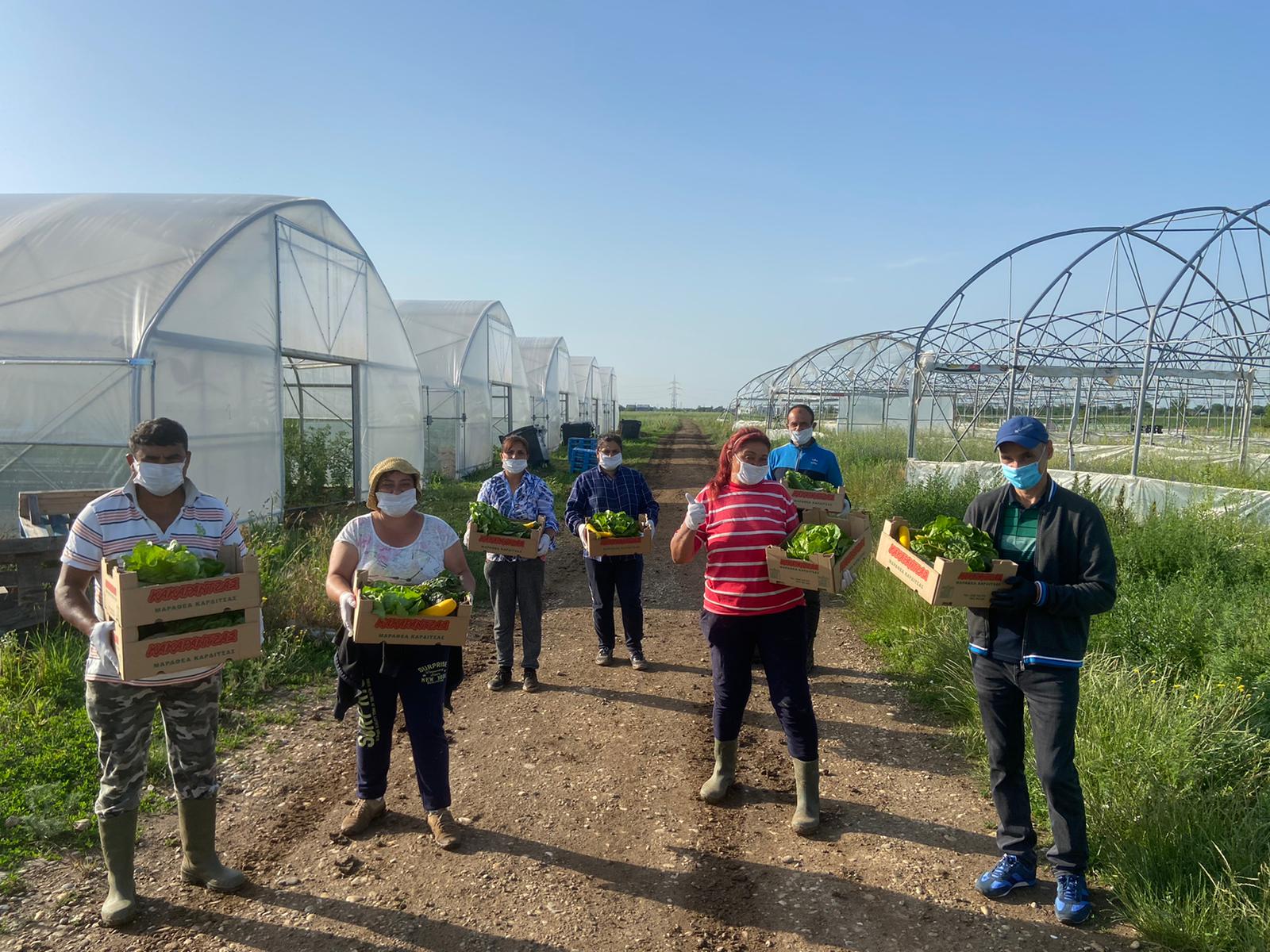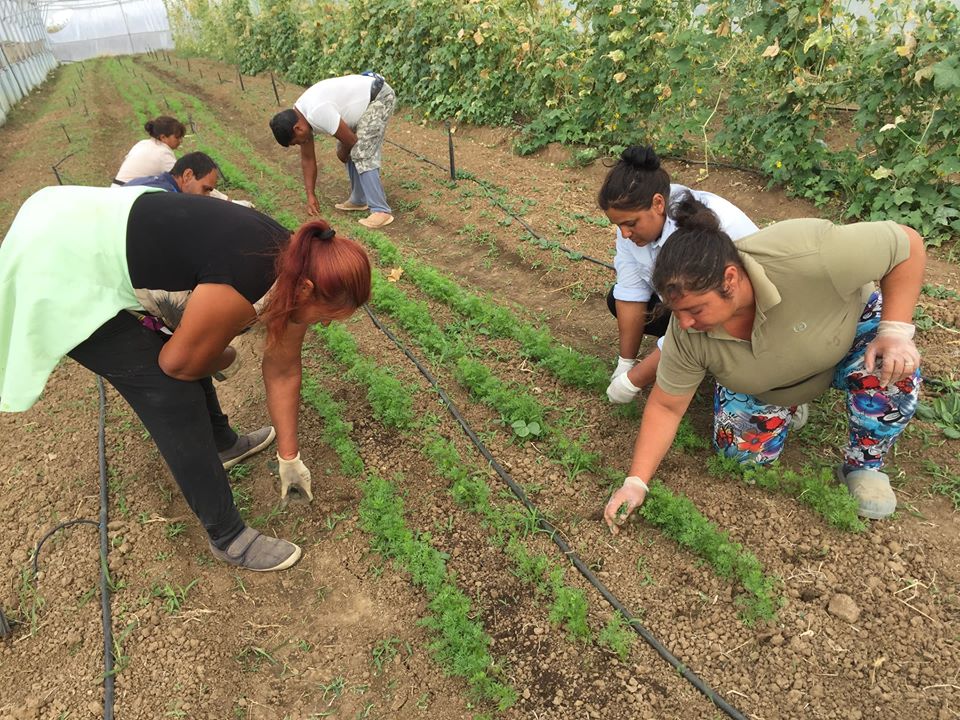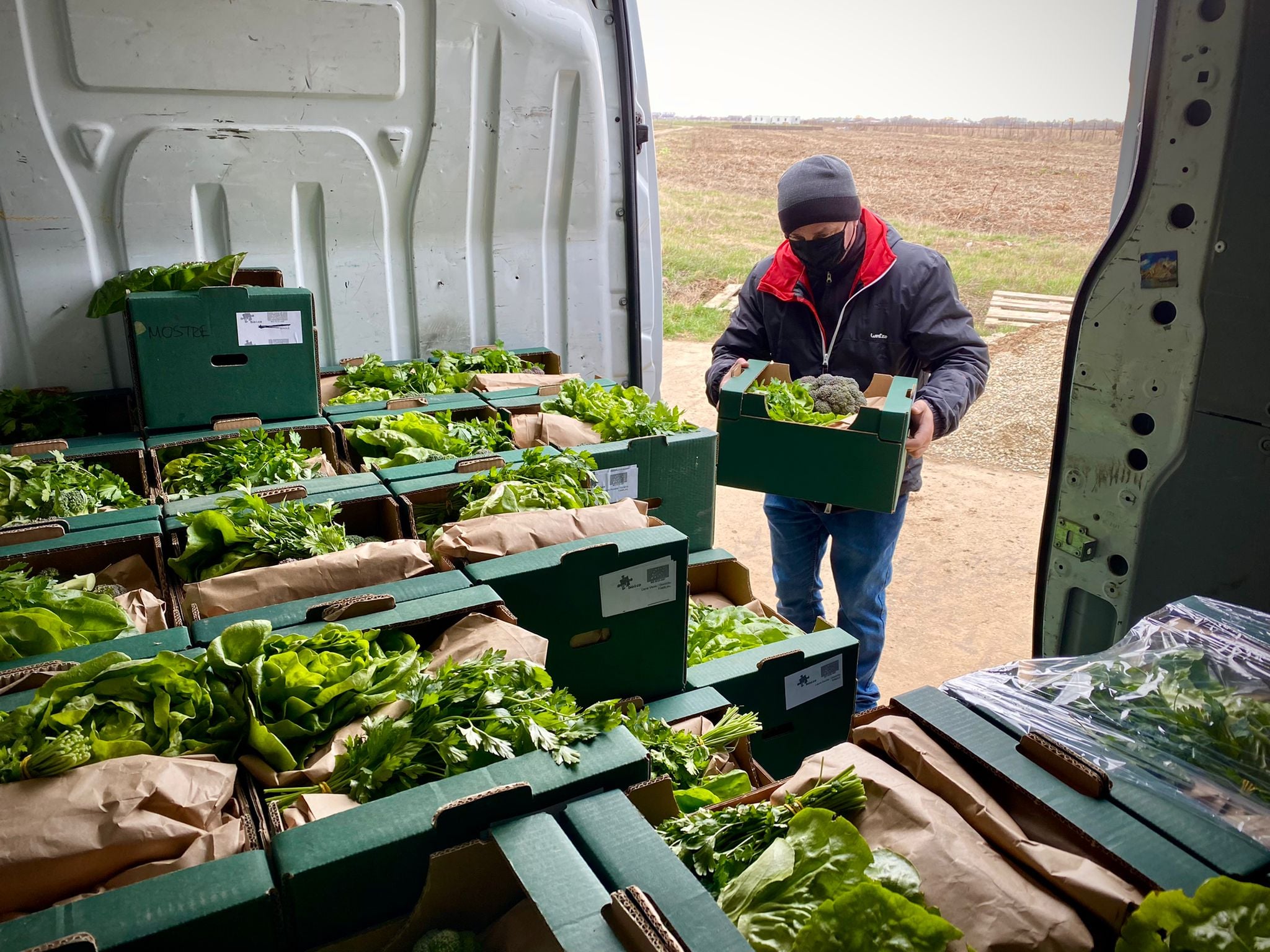bio & co farm is a project of Ateliere Fără Frontiere, a non-profit association whose mission is to support disadvantaged people in social and professional integration workshops for their rehabilitation and reintegration into society and the labor market. The farm is located in the village of Ciocănari in Dâmbovița County, which allows the weekly distribution of vegetables in short circuit, directly to subscribers, in a weekly basket that contains 8-9 varieties of organic vegetables.
At the bio & co farm we grow over 80 varieties of ecologically certified vegetables, on 4 hectares of fields and solariums, which allows us to have fresh, seasonal vegetables all year round.
The vegetables we grow are sold on a farm to fork program: our products are delivered every Wednesday directly from the farm directly to our customers, either at their address or at one of the different collection points we have across Bucharest. There are several types of baskets and subscriptions available, tailored to the needs of our subscribers. Baskets can be small (for one person or a couple) or large (for larger families).We alternate from week to week the varieties of vegetables in the basket depending on the season.
In addition, every Wednesday we send subscribers a newsletter containing networks based on the vegetables in the basket just delivered, to encourage them to experiment in the kitchen and to discover vegetables less popular in Romania but appreciated in Europe.
The employees of the farm are disadvantaged people from the local Roma community and beneficiaries in insertion from Bucharest and Ilfov (young people after leaving the placement centers, victims of domestic violence and trafficking, former detainees, homeless people, people with disabilities or addictions).
Please highlight how the project can be exemplary in this context
Bio&co’s main objective is to create an organic farm that relies on green agriculture to develop the local community and to grow vegetables that are healthy,diverse and solidary.
With this in mind, we are using only organic products to grow vegetables that are sold to subscribers or donated to social causes and ultimately reused, in the case of remaining parts or rotting vegetables, as compost that brings the products back in soil, without any waste. We do not use pesticides or chemical fertilizers on the farm and the soils and crops are constantly monitored to maintain organic certification. Overall, we protect the environment and biodiversity, the quality of soil, air and groundwater, respecting European and national standards of organic farming.
We are also looking at developing a local farm that not only uses local workforce and local materials, but also reinvests the income of the business back to the community by hiring vulnerable people that otherwise would face difficulties in joining the free labor market. Our aim in this regard is to grow and tell the story of organic vegetables and fruits that have the taste of work, dignity, solidarity, nature and the land from which they grow.
So far we have planted a variety of more than 80 organic vegetables, created a composting platform of 1000m2 and solariums that have a total surface of 4000m2, all of them sustaining the creation of jobs for more than 20 local people coming from vulnerable contexts.
All our actions have a common goal: to bring back local agricultural businesses that rely and support communities without other economic alternatives while also promoting a healthy lifestyle that is friendly for the human body as well as for the environment.
We believe that local organic food is an entrepreneurial model that will support the long term sustainability of local communities and climate balance in regards to biodiversity and food waste management.
Please highlight how the project can be exemplary in this context
We call the subscribers to our weekly vegetable basket consum'actors as they are thoughtful in their buying habits, and are guided in their choices by ethical and environmental considerations that bio&co can satisfy. The consum'actors are part of the bio&co growing community and are in constant connection with the developing agricultural events at the farm. They receive a weekly newsletter with the contents of the respective basket and with news from the farm site. Thus, they feel engaged and have a better understanding towards the quality of their daily food and are more prone to accept vegetables that are not perfect in terms of aspect. They have the chance to visit the farm and meet the workers that labor the soil. This interaction is meaningful in both ways: the clients feel empowered and in control of the food choices, whereas the workers feel integrated, accepted and happy to see the faces behind the name tags on each basket.
bio&co promotes solidarity and partnership in its actions and this is why each investment represents a small scale project that is backed up by business partners that adhere to the principles of sustainable agriculture and resilient agricultural practices and inclusiveness.
The farm wants to both revive and modernize the rural landscape from areas that are mostly forgotten by contemporary modern societies. In this regard, we planted 1300 acacias and 40 basswood in 2020, combining traditional agriculture with flora that can bring new life to communities. Moreover, the farm has multiple non-exploited areas kept purposely on our land for biodiversity to develop and for rural areas to visually go back into more natural landscape.
In the end, bio&co is a space of co-creation for people coming from different social backgrounds, reunited by the goal of wellbeing and respecting nature resources. Here they find a good place to grow organic food, respect other people's labor and learn about less waste practices.
Please highlight how the project can be exemplary in this context
Bio&co is fighting for social inclusion by providing a second chance for the vulnerable groups that are often stigmatized by society because they do not have a job, even though the local economic industry is not offering enough viable options. At our farm, our colleagues have the chance to access a job and the opportunity to regain control over their life and happiness.
Our colleagues have an average of 7-8 vulnerabilities that stop them from accessing the labour market. (low education level, long term unemployment, risk of poverty, minorities, etc.) Most of them live in the Ciocănești village where the farm is located and we are able to reach them with the help of the local authorities, especially the local townhall and social services authorities. The project supported more than 20 beneficiaries with the chance to develop professional skills that can allow them access to better life opportunities.
As part of Ateliere Fara Frontiere, one of the first work integration enterprises in Romania, bio&co provides the local employees with individual customized professional and social assistance by offering them support in finding better life and job opportunities, counseling in budget management or in logistical matters such as accessing second chance school programmes for adults. Therefore, we are contributing to the inclusion of vulnerable people into society by opening job opportunities in an area where the labor market is underdeveloped.
Also, as mentioned before, we are trying to engage with multiple groups of the society, making sure everybody is aware and involved in the road towards more local business that provides for the community. That is why we are both donating surplus vegetables towards social diners and selling most of our products to people from urban areas, where in most cases the big chain vegetable supply is their only accessible option for a healthy meal.
Please highlight how this approach can be exemplary
The starting idea of the bio&co farm was to bring local agriculture business that rely on organic food while giving back to the community that hosts us by hiring vulnerable adults and offering them support and counseling to access better life opportunities.
We have taken this idea and developed it to a sustainable network of NGO’s, private companies, ordinary people and vulnerable adults that work together for a social business that brings a positive impact to all of them: from green alternative for food waste, to job opportunities or to more options in terms of healthy, organic food, everybody work for both
Therefore, the project creates a circle of solidarity through which NGOs, private companies, vulnerable people and public institutions work together for the future of a more healthy eating habit, more diverse environment and more accessible employment opportunities. Any strong community can replicate our model if multiple actors work together:
The impact of our activities is interconnected and therefore growing our partners will increase the overall social impact of our farm for our beneficiaries and for our customers. We are constantly trying to balance the social mission of our project and look for better ways to support our colleagues in their path towards socio-professional integration while also looking to create a business that is inclusive and beneficial for our consum’actors. In both of these actions, we are implementing environmental friendly actions that should inspire our employees, customers and business partners to be more active in our mission to fight climate change and food waste.
Since 2015, it has supported more than 20 people from the Ciocanari village with job and training opportunities and created an educational farm programme where children can learn about subjects such as healthy alimentation, biodiversity, food waste management and climate change.
During the same timeframe, we have grown more than 80 types of vegetables that were sold in a total of more than 14.000 vegetable baskets directly to more than 160 consum’actors. The surplus was everytime reused in composting processes, among with more than 1 tone of food waste collected from partner restaurants and hotels. In total, more than 4 tones were reused and made into organic fertilizers.
All of these results were achieved in a farm that has 4 acres of agricultural designed soil, in which we have more than 4000 square meters of solariums and 1000 square meters for the composting platform, along with special spaces for storage or beekeeping.
Besides the numbers achieved, we have managed to create a process that is trusted by companies and private individuals alike, both of these categories choosing to buy from organic vegetables every week. Moreover, we have created a direct link between rural and urban areas that aims to connect the latter with nature and the former with the job opportunities any development society should have.
Our bio&co is probably the biggest result of the project, as it is formed from hundreds of individuals, companies and institutions that choose to work with us and to promote further to their public our social business model that sustains a healthy life through organic resources and work integration programmes
Please also explain the benefits that derived from their involvement.
Bio&co is a public advocate for climate positive actions and organic agriculture to the benefit of local communities. From this point of view, the project is a good model of `show, don’t tell` as it offers an alternative with positive social, not only environmental, impact that people can get behind and show more interest in.
As most of our consum’actors come from big urban areas and the beneficiaries who work at the farm are members of a small rural community, we are connecting two otherwise divided sections of the country and offering them the chance to indirectly work together to dissolve the inequities between them.
Moreover, the funding for many developing projects within the farm is provided by private companies who choose to be a part of an initiative that connects people from different areas and environments, creating a strong interconnection between those who believe is the future of local social businesess.
All of them have the chance to work directly with us as well, in special events that we organize during the year: voluntary work days with employeers from our partner companies that work for a day among our employers; a harvest day where both children and adults are welcome; visits for children or students from school and universities with an agricultural profile, etc.
Last but not least, we are working directly with other NGOs and social service institutions that recommend us potential employees that need our support to enter the labour market. By working closely with these types of institutions we are making sure that ideas such as sustainability and climate friendly are noticed and understood by the society as a whole.
Bio&co is fighting against three main challenges that modern societies nowadays face:
- Exclusion by margnizalition, discrimination or stigmatization of the people who come from vulnerable areas
- Food waste and poor resource management that ultimately lead to a negative impact for the environment
- Inequity and division within societies
Our project is tackling climate change as it promotes and puts to practice a model of business that has as its core foundation the respect for nature and the resources it provides. We try to create an agricultural area that takes into account the productivity aspect, but also the space flora and fauna need in order to grow and live in balance.
The objectives of th initiative in terms of climate action are to carry out a project that facilitates the transition to a climate neutral society and promotes a sustainable lifestyle that can be implemented by every company or individual: using the organic food the soil provides and learning to adapt our diet to it, instead of buying more food than the earth can produce.
Moreover, the project is fighting against social injustice by giving responsibility to vulnerable people who face difficulties in accessing the free labour market and giving them the chance to bring a social impact for the environment and their local community. We believe in their right to access a life where they find happiness and self-esteem in their work and we are trying to support them in this regard by offering them independence to assume responsibility, initiative and a role of a partner in the decision we take at the farm.
In every action we perform we try to involve our customers, our partners and our employers with the goal of destroying stereotypes and creating instead a space where everybody is equal, happy to work together and to connect through that one thing that unites us all: the love for a green planet with all its natural resources.
Bio&co is an unique initiative at a national level as it is the only social business that creates a model of organic local agriculture which is sustainable for the biodiversity and for the labour market of the community in which it activates.
The most innovative element of the project is probably the constant interaction and involvement of our customers and partners in the overall development of the project. With our activities and direct communication we are trying to make them feel more engaged with our mission and therefore create a community that works together at preserving or increasing the local fauna and flora, while also making sure that disadvantaged people are not left behind in the transition towards a more sustainable economy and society in general.
Having a multitudinal mission means that its impact is reflected in multiple social and economical areas of the society, bringing together people with different backgrounds, from private companies of different sizes, to adults facing vulnerabilities and children from disadvantaged areas.
The project is using its creativity to share the benefits of local organic agriculture in a `show, don’t tell` manner, where the results are directly impacting the local community that can sustain a picturesque environment while also developing new job opportunities. We are trying to show that organic food is not only good for your health, but also for the local community and biodiversity of the area.
Please provide clear documentation, communication of methodology and principles in this context.
Our project is an easy initiative to reproduce as our activity revolves around the simple concept of using organic local materials and human resources from the community. We want to show the long term benefits of a social business model, in comparison to the general agriculture companies that increase productivity through fertilizers, pesticides and other substances, in the detriment of a healthy life for community and customers.
One of the most beneficial conclusions of our project is that solving one or more social issues through an environmentally friendly process can increase the level of interest in climate fighting. We have noticed through activities that individuals are more willing to take an action for the environment if it also has another social impact. This is clearly an intermediary step, but a necessary one in order to inform more people about the benefits of organic agriculture for developing sustainable communities.
The goal of every climate action is not only to reduce pollution, but to replace with minimum impact another action that has a negative impact for the environment. In this regard, the general response to our project has been really positive from our partners and customers as we have offered a healthy alternative for their daily diet.
Another reason for which the initiative is one that should be more applied at the EU level stands in the multi-sectoral partnership between the private, public and NGO sector that is necessary in order to change social norms for waste management and social inclusion. We do that by offering job opportunities to people from vulnerable areas, working with private companies to invest in the organic infrastructure of the project and selling the final products to urban areas that do not have an easy access to healthy food.
Bringing people together is the only way to make sure that no one is left behind in the transition to an inclusive society that fights climate change by relying on natural resources.



@Ateliere Fara Frontiere, 2020
Content licensed to the European Union.